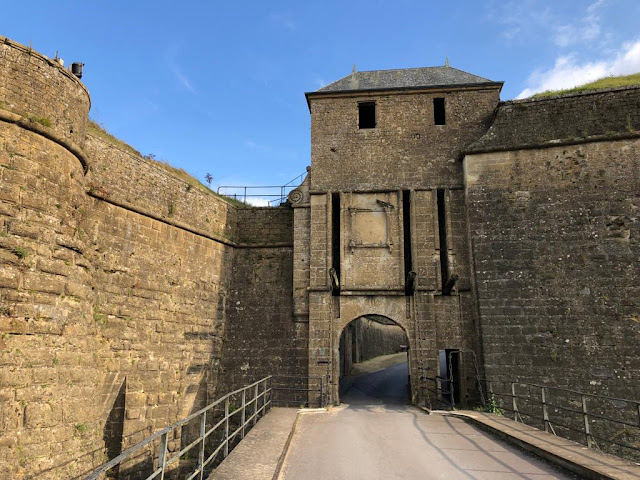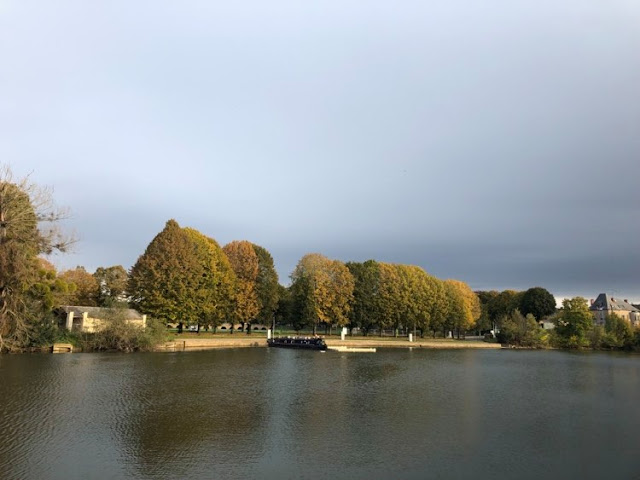 |
| Sunday sunset |
Country borders can be deceptive. We’ve been thinking we’re a good way away from Belgium as we know there are a further 100 kilometres to travel north on the Meuse before it reaches the border and then makes its way onwards to Maastricht and then through Holland to the North Sea. Studying the map for likely places to drive to over the weekend we suddenly realised that we’re only 13 kilometres from the north-eastern border. No wonder we’ve been seeing so many Belgian cars lately. They’ve wrongly made us think that there’s lots of Belgians on holiday, but the majority are probably just going about their daily business here in Sedan.
Thursday morning
was set aside for our weekly bridge lesson followed by an hour or so of
play. Later in the afternoon we moved
from the pontoon mooring and moored up against a quay where we would be better
placed to catch more of the sun.
 |
| Our new mooring in Sedan |
After doing a few odd jobs on Friday morning we drove to Montmédy for a good look around the place. Karen had never visited but I’d been a couple of times as I’d left the car there while we took the boat from Stenay to Sedan. The only public transport between the two towns involved a bus from Stenay to Montmédy and then a train up to Sedan. Timetabling made it impossible to do the bus and train journey in one day, so I split it into two by leaving the car at the changeover point. That’s a long explanation for why Karen had never been but from what I’d seen it was definitely worth going back to.
We parked outside
the mairie and devised a circular walk up the hill to the old town and back
down around the other side. After
leaving the lower town we followed a cart track that zigzagged its way to the
top and was still cobbled for most of the way.
Montmédy has changed hands many times over the centuries and since the Gallo-Roman period it has belonged to Belgium, Luxembourg, Burgundy and Germany. Immediately before it finally became part of France in the mid-1600s, it had been under Spanish rule. Its strategic position on a hill in the Meuse valley meant it had to be fortified from its early years. Most of the heavy fortifications seen today were built in the 1650s and are certainly amongst the most impressive we have visited. There are two main walls completely encircling the town with a moat between. Apparently, the moat was never watered but still formed an important line of defence.
 |
| The never watered moat |
The outer wall and the moat are open to the public and are free to walk around. We went through a doorway in the main wall and, after climbing up an interior passage, came out into the town by the tourist office where we handed over €5 each so we could walk around the ramparts both on top and through passageways within.
 |
| Outer wall and moat from the ramparts |
 |
| The outskirts of the lower town |
 |
| Lower road entrance |
There was an extensive area of passageways inside the inner fortifications, many of which can still be explored. It was slightly unnerving as we had to share them with bats swooping over our heads in the often-confined space. Even though we knew they wouldn't fly into us it was slightly disconcerting for a while.
Other than a guy
who was leaving when we arrived, we had the place to ourselves and when we
finished, we had a quick look around what was left of the town inside. The only bar wasn’t open, so we made our way
back down the other side of the hill, this time, following the road.
 |
| Upper road entrance |
We felt quite tired by the time we’d finished but in a good way and it wasn’t long before we were back in Sedan and could relax on board for the evening. We would thoroughly recommend a visit to Montmédy and its citadel if you’re ever in the area.
Much of Sunday
was spent driving along the length of the next canal we will be cruising on, the canal des Ardennes, checking for mooring
spots with good internet signal for the days Karen works and also to find where
we could pick up water along the way. It’s
wasn’t as onerous as it sounds as the canal is short by French standards, only 88 kilometres long, and we’d
already checked the first section we'd be joining when we leave the Meuse. Not only that, but we were making a day of it
with some sightseeing and lavoir hunting along the way.
We’re finding lavoirs are few and far between in the Ardennes département, quite different to some we have been in this year. For example, in Haute-Saône it was unusual to find a village without a lavoir and many villages had more than one. Whereas in Ardennes we’ve been struggling to find any and those we have found have often been closed to the general public; however, one we found during the day was open. Being built over a stream it was also still in water and had lush plant growth around it. I'm including a picture of this lavoir as it was the first of over 200 lavoirs we have seen, with a brick lined basin. The water was so clear that you could be mistaken for thinking there was none in the basin at all.
 |
| Lavoir at Tourteron |
The canal is very rural so the moorings were few and far between and without services but it does run through a couple of towns, Le Chesne and Rethel, both of which had working water points. Internet signal was generally good though so Karen shouldn’t have any issues either. Rethel had a train station linking Châlons-en-Champagne with Sedan, so we’ll probably dispense with the car pretty soon and leave it in Châlons until December.
 |
| Lots of room in Rethel with water points and a couple of small, abandoned cruisers |
The slow cooker had been on all day so we had a lovely roast soon after we got back home to the boat.
Monday was mild
and dry, so I spent the morning putting the final topcoat of blue on the rear
deck areas. In the afternoon I took
Buddy to the local vets for his annual check-up. Having worked out we were so close to Belgium
earlier in the week I wasn’t surprised to find out the practice was run by a
Belgian couple which also explained the two Belgian
plated cars in the driveway.
I had an interesting
phone conversation with a fellow British boater on Tuesday. He and his wife had a Dutch barge and cruised
in France for a few years then sold her and explored Europe in a camper. They now have a narrowboat in the UK and are thinking
about bringing her out to France. As we
are one of the few people with narrowboats over here, he’d made contact a while
ago and we’ve been exchanging ideas ever since.
The main thrust
of this particular conversation related to the impact on bringing UK boats into
the EU post Brexit. VAT and import duty are payable when bringing a boat over
but there is a temporary transition relief period whereby if it returns to non-EU
waters within 18 months then the taxes aren't payable. Also, it can be immediately brought back for another 18
months, VAT and duty free. Transporting a
narrowboat boat on a lorry back to the UK, even for 24 hours, and then back to France again
would be ridiculously expensive. Also, taking
a narrowboat halfway across the Channel to reach non-EU waters and then
returning to France or Belgium is rather risky.
This raised the question, is it worth coming over at all as they would
only get 18 months’ cruising in at the most?
While giving the
roof a good wash and scrub later on I got to thinking about the 18-month non-EU
problem and the nearest non-EU countries.
I’ve known for a long time that it’s technically possible to sail a
narrowboat over much of mainland Europe and even as far as the White Sea in the Arctic via Moscow and St. Petersburg. Ukraine is one of the nearest non-UK countries and can be reached by travelling through northern
Germany and then Poland and, after updating the boat log to show it’s entered
non-EU waters, our friend could immediately turn around to re-enter the EU. I know Serbia is on the cards for joining the
EU, but it can be reached by heading through southern Germany and then Austria,
Slovakia, Hungary and Croatia. If Serbia
joins the EU, then it would mean carrying on through Serbia, Bulgaria and
Romania before reaching the non-EU state of Moldova. Fascinating stuff but it would mean not a lot
of time was spent in France which is the main country our friend wants to cruise
in.
Since we've been moored on the quayside in Sedan we've noticed that the river level has been steadily dropping. Each day it's become increasingly difficult to get on and off the boat so I moved the boat back to the pontoons during the afternoon. As the pontoons rise and fall with the water levels we shouldn't be affected by any changes for the rest of our stay in Sedan.
 |
| Dark foreboding sky above our mooring in Sedan on Wednesday morning |
During the morning I came up against yet another Brexit issue, this one one impacting us. I'd received an email from the French tax service saying they would soon be making an annual credit to our account. As in the UK, charitable donations attract the equivalent of gift aid. In France, taxpayers are credited with 66% of that relief at the beginning of the tax year based on their tax return for the previous year (France operates on calendar years). The email was a reminder to check if we plan to make any significant changes to these payments as they want to avoid crediting too much or not enough. I know this doesn’t sound like an issue, and it was our choice to stay in France, but from the beginning of 2021 the relief can only be obtained for EU based charities. So, I now need to go through the rigmarole of claiming relief in the UK and stopping it in France.
It sounds strange
having this credit in place until you realise that charitable donations are
treated like childcare costs in France.
Up to 50% relief can be obtained for childcare costs so getting a credit
for the following year’s payments upfront must be a boon to many young families.
Oh, and in case
you were wondering why we’ve spent nearly two weeks in Sedan, then all will be
revealed in the next update.
No comments:
Post a Comment